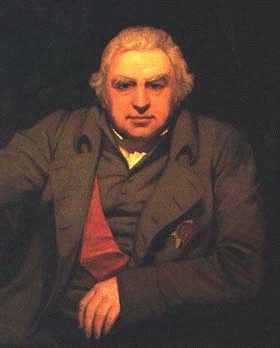1902 Encyclopedia > Sir Joseph Banks
Sir Joseph Banks
British naturalist and patron of science
(1743-1820)
SIR JOSEPH BANKS, for upwards of forty years president of the Royal Society of London, was born in Argyle Street, London, on the 13th of February 1743.
He was the only son of William Banks, a gentleman of considerable landed property, whose father had derived his fortune principally from successful practice as a physician in Lincolnshire, had been on one occasion sheriff of that county, and had for some years represented Peterborough in parliament.

Sir Joseph Banks
Very little is known of Joseph’s early life and education. He appears to have been sent at the age of nine to Harrow, and after spending four years there, was removed to Eton. Here he seems first to have acquired a taste for botanical pursuits, and was accustomed to spend all his leisure hours in the beautiful lanes and fields round the school.
He carried the same fondness for natural history to Oxford, where he was entered an a gentleman commoner of Christ’s College; and by his exertions a lecturer on natural science was for the first time brought into the university. After taking an honorary degree he left Oxford; and at the age of twenty-one he found himself possessed of ample means, his father having died in 1761.
Three years later he made his first scientific expedition to Newfoundland and Labrador, and brought back a rich collection of plants and insects.
Shortly after his return, Government resolved to send out Captain Cook to observe the transit of Venus in the Pacific Ocean, and Banks, through the influence of his friend Lord Sandwich, obtained leave to join the expedition.
He made the most careful preparations, in order to be able to profit by every opportunity, and induced Dr Solander, a distinguished pupil of Linneaus, to accompany him. He even engaged draughtsmen and painters to delineate such objects of interest as did not admit of being transported or preserved.
The voyage occupied three years, and many hardships had to be undergone; but the rich harvest of discovery—many natural phenomena being for the first time brought to light—was more than adequate compensation.
Banks was equally anxious to join Cook’s second expedition, and expended large sums in engaging assistants and furnishing the necessary equipment; but, owing to ill-feeling on the part of some Government officials he was compelled to relinquish his purpose.
He, however, employed the assistants and materials he had collected 'in a voyage to Iceland, returning by the Hebrides and Staffa, the geological formation of which he was the first to describe.
In 1778 Banks was elected president of the Royal Society, of which he had been a follow from 1766. His predecessor had been compelled to resign owing to some disagreement with the court, but Banks was always a favourite with the king. In 1781 he was made a baronet; in 1796 he received the Order of the Bath; and in 1797 he was admitted to the Privy Council.
During the long tenure of his office as president, Sir Joseph did much to raise the state of science in Britain, and was at the same time most assiduous and successful in cultivating friendly relations with scientific men of all nations. His kindness and liberality were beyond praise, and he was most generous in affording to other naturalists the free use of his vast materials. It has, however, been made matter of objection to him, that from his own predilections he was inclined to overlook and depreciate the labours of the mathematical and physical sections of the Royal Society.
Sir Joseph died on the 19th March 1820, at the age of 77. He bequeathed his valuable collections of books and botanical specimens to the British Museum.
His only writings are two small tracts of little importance; he seems to have given up his intention of writing an elaborate treatise after the death of his friend and fellow-labourer, Dr Solander. His fame rests mainly on his numerous, discoveries in botany and natural history.
See Cuvier, Eloge Historique de M. Banks, 1821.
|
